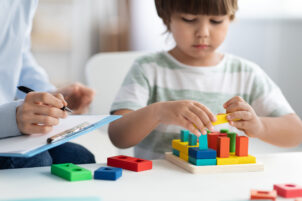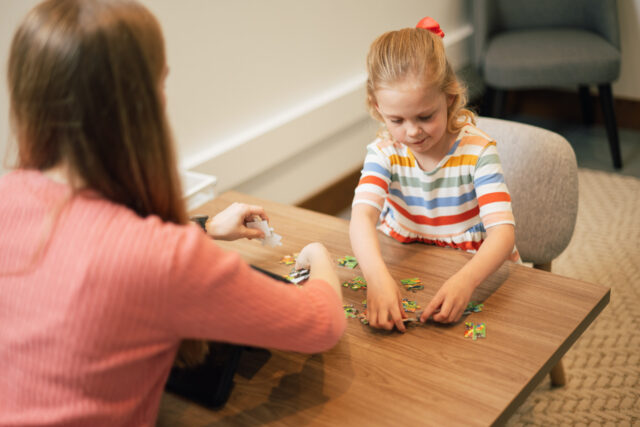Nurturing Potential
Comprehensive Preschooler Evaluations
Wondering about your preschooler’s development is a natural part of parenting. Our comprehensive diagnostic assessments for 4- and 5-year-old children identify strengths and areas of concern so that we can catch any challenges early and get support in place to help them thrive. Through same-day feedback and clear, actionable insights, we help you chart a confident path forward for your child.
Understanding Your Child’s Development
A neuropsychological evaluation can provide important information about how your child learns and develops, offering insight into areas where they may benefit from additional support. This detailed understanding helps guide accommodations, interventions, and enrichment opportunities, setting your child up for success from a young age. Our preschool evaluations assess a range of developing abilities in areas such as:
- Cognitive Abilities: How your child thinks, learns, remembers, and solves problems.
- Attention and Executive Functions: How your child focuses, manages their emotions, and behavior, and starts, plans, and organizes tasks
- Communication: How your child learns to understand and use words
- Motor Development: How your child learns to use their body to move and do things
- Social Skills: How your child learns to get along with others, build relationships, and understand feelings
- Academic Readiness: How your child builds the early skills that help them feel confident and ready to learn
- Emotional Regulation: How your child learns to understand, manage, and express their feelings
Please note that we do not assess for sensory processing disorders such as sensory integration, auditory processing, or visual processing disorders. If you are looking for an assessment for an older child, learn more about our Assessments for Children & Adolescents (ages 6-18).





Important Early Factors
Every child’s journey is unique, and some early experiences can influence development. Understanding these factors helps us provide your child with the most supportive and comprehensive assessment. Some common early factors include:
- Premature birth or low birth weight
- Birth complications or medical challenges during delivery
- Prenatal substance exposure
- Congenital heart disease or other medical conditions
- Foster care or institutional care before adoption
- Family history of developmental or learning differences
These experiences don’t define your child’s potential, but recognizing them helps us create the most effective support plan tailored to their individual needs.
The Evaluation Process for Preschoolers
We’ve created a warm, welcoming environment where preschoolers (ages 4-5) feel comfortable and engaged throughout their evaluation. Our process blends scientific rigor with interactive and developmentally appropriate assessment methods to reveal your child’s unique cognitive profile, including areas needing support and unique strengths. With these insights, you can navigate your child’s developmental journey with confidence, implementing targeted interventions and enrichment opportunities that establish a strong foundation for future learning.
-
The Preschool Assessment Experience
The neuropsychological evaluation for your preschooler includes a thoughtful review of your concerns through clinical interviews, developmental history, and standardized assessments. During and after your child’s session, we dedicate time to meeting with you as parents to discuss your child’s history and specific concerns. Understanding the attention span of preschoolers, we structure our evaluations typically as a morning half-day session with your child. Your child will work with one of our experienced team members who will make the evaluation feel like play when possible—building with blocks, solving puzzles, and exploring words in an engaging way. We use stickers, movement breaks, and playtime incentives to keep your little one comfortable and motivated.
-
Same-Day Insights
After testing is completed, we’ll meet to discuss what we’ve learned about your preschooler’s developing skills. We’ll provide clear explanations of initial insights and any relevant diagnoses. This conversation about your child’s unique learning profile focuses on your child’s strengths and areas needing extra support and attention. Ages 4-5 represent a critical time for development, and our feedback focuses on actionable strategies that can make a meaningful difference before kindergarten begins.
-
Full Report
The following week, you’ll receive a comprehensive written report detailing our findings and recommendations. This document serves as a valuable tool for supporting your preschooler’s development with specific strategies for home and, if applicable, preschool or daycare environments. The report may also include recommendations for early intervention, helping establish access to relevant supports during these formative years. We aim to empower you with detailed knowledge and recommendations tailored to your child’s thinking and learning styles, setting them up for confidence and success as they prepare for their elementary school journey.


I’m a school psychologist. I just read one of Dr. Adams’ reports that was written for a child with ADHD, and know how hard practitioners work to write meaningful and useful reports. The recommendations and explanation of ADHD were so clear, concise, and well-written. I found myself rethinking how I might explain ADHD to others, because the explanations were so descriptive and helpful.

A Caring Team That Specializes in Little Ones
At our Minneapolis/St. Paul and Wayzata locations, your preschooler will be welcomed by specialists in early childhood development. Our neuropsychologists have expertise in pediatric neuropsychology. Dr. Ashley Isaia, a pediatric neuropsychologist with specialized preschool education and expertise, oversees evaluations and works with our skilled psychometrists to create an interactive and comfortable environment.
Frequently Asked Questions
Parents often have questions about neuropsychological evaluations for their 4- and 5-year-olds. Below are answers about our comprehensive preschooler assessments offered in the Minneapolis/St. Paul area, with offices in Wayzata and Cathedral Hill.
How is your evaluation different from an Early Childhood Screening?
Early Childhood Screening (ECS) is a quick, no-cost check required for entrance into Minnesota’s public schools. ECS briefly assesses thinking, language, and motor skills and includes parent reports on social-emotional development. It is designed to highlight possible areas of concern and serves as a general screening tool for all children to uncover potential developmental concerns that might go unnoticed. It does not provide a clinical diagnosis or comprehensive understanding of the reasons for the concerns.
Our neuropsychological evaluation is designed for parents concerned about their child’s development, who need thorough answers and next steps. Here’s how we differ:
- Comprehensive Assessment: While ECS provides a brief check, we can thoroughly evaluate cognitive abilities, emerging attention and executive functions, fine motor development, social skills, academic readiness, and emotional regulation.
- Direct Testing: Our evaluation involves several hours of hands-on activities and direct interaction with your child, not just parent reports.
- Identifying Risk Factors & Possible Explanations: In addition to measuring your child’s current functioning, we carefully review prenatal and perinatal history, early developmental milestones, family history, and medical background to better understand possible contributors to developmental concerns.
- Diagnostic Capability: ECS only flags potential concerns. When appropriate, we can provide formal diagnoses, helping you access specific services and accommodations immediately.
- Actionable Recommendations: We provide a detailed report with individualized strategies for supporting your child’s unique pattern of strengths and challenges at home and school.
Many families come to us after an early childhood screening has identified developmental concerns or when parents need answers beyond what a brief screening can provide. Our comprehensive evaluation gives you the thorough understanding needed to best support your preschooler’s development.
What conditions can and can’t be diagnosed at ages 4-5?
Early childhood is a time of rapid development, and while we can identify many conditions during the preschool years, not everything can be reliably diagnosed at ages 4-5. Some conditions are clear, while others may need more time to emerge fully.
What we CAN often diagnose:
- ADHD (Attention-Deficit/Hyperactivity Disorder) – Difficulties with attention, impulse control, and activity level
- Global Developmental Delay – When a child is behind in multiple areas of development
- Language Disorders – Difficulties understanding or using spoken language
- Intellectual Giftedness – Advanced cognitive abilities
- Anxiety and Depression -,Even young children can experience emotional struggles
- Adjustment Disorders – Difficulty coping with life changes or stressors
- Attachment-related concerns – Challenges with emotional bonds and relationships
What we CANNOT formally diagnose yet:
- Dyslexia and other specific learning disorders – While these require a child to be in school and have formal reading instruction, we can identify pre-reading skills and patterns that may indicate an increased likelihood of dyslexia, allowing for early intervention strategies.
What we CAN identify as risk factors:
Even when a formal diagnosis isn’t possible—or appropriate—at this age, our evaluation can highlight areas that may place your child at greater risk for future challenges. By carefully reviewing your child’s history, we gain a clearer picture of potential concerns that may emerge over time.
For example, we can:
- Assess early cognitive skills that form the foundation for reading and learning.
- Detect attention or self-regulation difficulties that may not yet meet full criteria for a diagnosis but could still benefit from monitoring and support.
- Identify social-emotional or behavioral patterns that may create challenges if left unaddressed.
At this age, the goal isn’t always to determine a diagnosis. Instead, it’s to understand your child’s unique developmental profile, anticipate areas where extra support might be needed, and provide practical strategies to help them thrive. Early awareness and intervention are powerful tools for promoting positive outcomes.
How do I know if my preschooler needs an evaluation?
Trust your instincts—if something feels off about your child’s development, an evaluation can provide clarity and peace of mind. Early intervention during the preschool years can make a profound difference in your child’s trajectory.
Consider an evaluation if you notice:
- Concerns raised during an Early Childhood Screening
- Not meeting typical developmental milestones for their age
- Feedback from daycare or preschool about behavioral or developmental issues
- Social differences like limited eye contact, playing near but not with other children, or unusual play routines or patterns (like lining up toys or having specific ways that toys must be played with)
- Difficulty with attention or emotional regulation compared to peers
Risk factors that may warrant early evaluation:
- Family history of ADHD, dyslexia, or other learning disorders
- Premature birth or low birth weight
- Birth complications or prenatal substance exposure
- History of foster care or institutional care prior to adoption
- Medical conditions like epilepsy or congenital heart disease
- Genetic disorders
The case for early intervention:
The preschool years are a critical window for intervention. Early identification allows you to:
- Implement support strategies when your child’s brain is most adaptable
- Adjust your parenting approach to better meet your child’s needs
- Access early intervention services
- Build your child’s confidence before academic demands increase
- Establish accommodations before kindergarten begins
If your gut is telling you something isn’t quite right—whether at home, preschool, or with peers—don’t wait. An evaluation now can help you understand your child’s unique profile and provide the tools to support their success from the very beginning. Every child’s brain works differently, and understanding how your little one thinks and learns isn’t about finding something “wrong”—it’s about discovering their unique strengths and the best ways to help them thrive.
What are your policies regarding insurance?
To ensure we can provide thorough evaluations, we are an out-of-network provider and do not accept insurance. Unfortunately, insurance companies impose strict limitations on how much time can be allocated to different parts of an evaluation. For complete details about potential reimbursement opportunities, please visit our Fees & Payments web page.
Request an Evaluation
Through our preschool assessment, you’ll gain valuable insights into your child’s developing cognitive abilities and learning profile.

